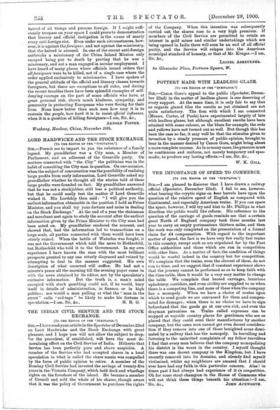THE IMPORTANCE OF SPEED TO COMMERCE.
[TO THE EDITOR OP THE "SPECTATOR:1 SIR,—I am pleased to discover that I have drawn a railway official (Spectator, December 22nd). I fail to see, however, what bearing the cryptic signs on beer barrels have upon the question of the relative speed of English as compared with Continental, and especially American trains. If you can spare the space, however, I will try and hint to Mr. Phillips in what direction the public would like reform. His reference to the question of the carriage of goods reminds me that a certain great North of England company took three months last year to carry an empty portmanteau thirteen miles, and then the work was only completed on the presentation of a formal claim for £4 compensation. With regard to the important matter of speed, the fact is we have very few really fast trains in this country, except such as are stipulated for by the Post Office authorities and those which are run in competition with other lines. As a matter of fact, the condition of things would be woeful indeed in the country but for competition. We complain that the trains, even the slowest of them, do not run to time, and we suggest that if constant experience shows that the journey cannot be performed so as to keep faith with the time-table, then it would be a very easy matter to change the table. We complain that heated carriages, luxurious upholstery, corridors, and even civility are supplied to us when there is a competing line, and none of these when the company has a monopoly. When we have a choice of routes upon which to send goods we are canvassed for them and compen- sated for damages ; when there is no choice we have to sign beforehand that the goods go at our own risk, and even the drayman patronises us. Trains called expresses can be stopped at wayside country places for gentlemen who are so placed that they could send their manufactures by another company, but the same men cannot get even decent considera- tion if they remove into one of those benighted areas domi- nated by a railway that has the monopoly. In travelling and listening to the uninvited complaints of my fellow travellers I find that every man believes that the company monopolising his district is the worst in the country. I myself thought there was one decent company in the Kingdom, but I have recently removed into its domains, and already find myself victimised, whilst my neighbours are amazed that I should ever have had any faith in this particular concern. Alas ! in times past I had always had experience of it in competition. Oh for some stout champion in the House of Commons who will not think these things beneath his attention I—I am,


































 Previous page
Previous page